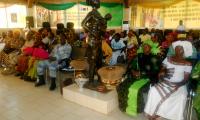Report highlights important role of paralegals in post-crisis Mali

The on-going jihadist conflict in the north and cases of Ebola are too often the only news headlines that emerge from Mali. However, these days positive changes are happening on the ground thanks to the hard work of paralegals.
The new 2014 Paralegal Report in Mali highlights the important work and impact paralegals have on the ground as well as provides insights into the challenges an average Malian faces. This include issues relating to violence against women, forced marriage and family matters such as divorce, inheritance, land, birth certificates, as well as access to justice.
“It is important to acknowledge the often overlooked but important work of community paralegals in Mali, a geographically expansive country with weak justice infrastructure,” Lise Dahl, Special Advisor at the Danish Institute for Human Rights, says.
123 community-based paralegals are currently active in seven regions in Mali (including regions such as Timbuktu in the troubled north of the country). Paralegals are sensitising their communities on their rights, mediating conflicts and helping the population seek access to justice.
Assistance through partnership
The institute has provided technical assistance and input to the report through its local partner, the legal aid organization DEME SO (which means ‘house of law’ in Bambara, Mali’s local language).
The report makes several key recommendations: expanding the geographical coverage of the programme, continuing to develop the paralegal curriculum, which, for example, should include transitional justice, maintaining training for paralegals, providing increased support and supervision of paralegals in their work and promoting the work of paralegals nationally.
“Paralegalism is an invaluable mechanism for receiving legal advice and referrals and for resolving conflicts at the community level; it deserves to be valued and recognised at all levels’’, explains Ibrahima Koreissi, National Coordinator of DEME SO, based in Bamako.
Report launch and awareness raising
The report was officially launched on January 28 in Mali’s capital, Bamako. Presided by the Secretary General of the Ministry of Justice and the Ministry of Women’s Affairs, the event gathered 44 paralegals from all over the country along with five local partner organisations working on legal aid and the promotion of women’s rights, including DEME SO.
The launch was held in tandem with the ‘Day of Paralegals’ during which paralegals from each region were given the opportunity to present and discuss their strengths and challenges, and to exchange views on key issues such as the inherent tension between the role of paralegals and the weight of customs and traditions in their communities.
“The report and a paralegal day such as this where all the paralegals from the country can share experiences, is a key element in promoting and showing support for their work”, says Lise Dahl.
The Danish Institute for Human Rights, through its partnership with DEME SO, has developed and provided technical assistance to this paralegal programme for several years, including training and developing tools for paralegals. The programme currently receives financial support from the Swedish and Danish Embassies in Mali.
Irene Hvass, Programme Officer for Good Governance at the Danish Embassy in Mali, explains the importance of the initiative:
“Paralegals play a central role in bridging the gap between the formal and the informal legal systems – a major challenge within the justice sector. The lack of access to justice of the Malian population is considered among the root causes of the recurrent conflicts in Mali and in this context, the work of DEME SO is of utmost importance.”
